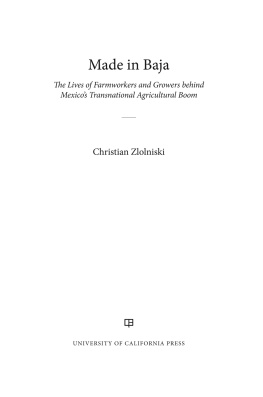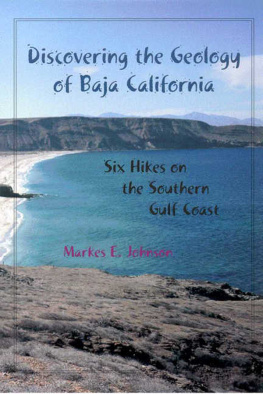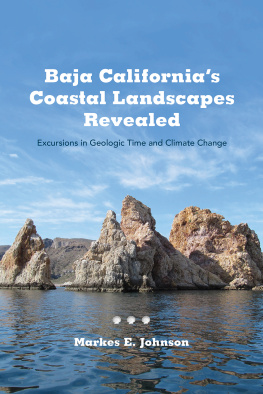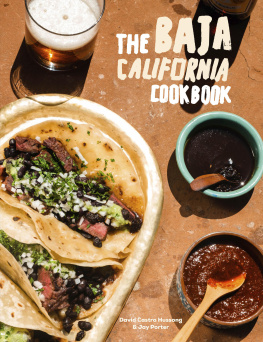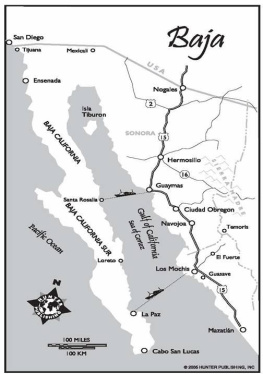ACKNOWLEDGMENTS
This book would not have been possible without the support and encouragement of many people throughout the long years it took to complete this project. First, my sincere thanks to all the people in San Quintn who patiently shared their time and knowledge with me. Using the pseudonyms employed in the book to protect their privacy, I am particularly grateful to Esther Chvez, Celeste Hernndez, Anayeli and Martn Fernndez, and Ramn and Aurelia Surez for sharing their experiences as farmworkers and residents in San Quintn. Thanks also to Agustn Meja, Antonio Pedroza, Jaime Coronado, Justina Snchez, Laura and Luis Flores, Josefina Rodrguez, Rodolfo and Adelina Moreno, Elisa and Nicols Robles, Rafael Montes, Arcadio Romn, Manuel Snchez Ponce de Len, and many others who also helped me along the way. They were always eager to talk even after long hours of hard work, opening their homes and introducing me to relatives, friends, and neighbors to facilitate my research. I also thank the growers, farm managers, and agronomists who invited me to tour their ranches and talk about their businesses and facilities and the challenges of growing fresh crops for export markets. My special gratitude to Henry Clark, Martn Fuentes, Jess Pea, Joaqun Cuenca, Andrs Palma, and Rubn Hidalgo, as well as the representatives of other companies who opened their doors to me.
I am grateful to the public officers in many government institutions in San Quintn and Baja California. First and foremost, my gratitude to the agronomists of the local Secretariat of Agriculture (SAGARPA) office in San Quintn, especially Arturo Ramos and Eusebio Rincn, who every year provided the latest data available about crop production in the region and from whom I learned much. I also thank the public officials at the Comisin Nacional para el Desarrollo de los Pueblos Indgenas (CDI) in San Quintn and Ensenada, especially Isidro Prez Hernndez for sharing his insightful knowledge about Mexicos agricultural labor laws. My thanks also to the directors of CESPE, the local agency responsible for providing water to residents in the region and to Radio XEQUIN La Voz del Valle (The Voice of the Valley), an indigenous community radio station that helped me during the first stage of my project.
Many friends and colleagues, more than I can remember, read and provided insightful comments on the multiple chapter iterations. My good friend Annegret Staiger provided loyal support and encouragement throughout the years, reading and offering wise comments. I am also indebted to Josiah Heyman, Roberto lvarez, David Griffith, and Humberto Gonzlez for their detailed reading of and suggestions on the final manuscript. I also thank Juan Vicente Palerm who read and offered valuable advice on my analysis of Bajas horticultural industry; he remains an inspiration for ethnographic research on farm laborer rural communities in Mexico and the United States. I also thank Teresa Figueroa Snchez for sharing her knowledge about farmworkers in the strawberry industry in Santa Mara. My deep gratitude also to my colleague and friend Roberto Trevio who carefully read and helped me edit earlier iterations and the last versions of the manuscript. I also thank Paul Durrenberger and Suzan Erem, who organized a workshop at the University of Iowa on labor unions in neoliberal times, for their comments on my analysis of labor unions in Mexico. I am also grateful to Sharryn Kasmir, Sian Lazar, and the anonymous readers of Dialectical Anthropology for their sharp comments and suggestions on two articles about farmworkers vulnerability and mobilization responses that helped me refine the analysis on these issues in the book. My sincere thanks also to Naomi Schneider and the staff at the University of California Press for their patience while I completed the book.
The book has benefited from collegial support and input from faculty members at the University of Texas at Arlington. I thank Amy Speier and Heather Jacobsen, my colleagues in the Department of Sociology and Anthropology, for reading and providing insightful suggestions on early drafts of several book chapters as part of a writing group. I also thank my colleagues at the Center for Mexican American Studies (CMAS), Cristina Salinas, Ignacio Ruiz-Prez, Erin Murrah-Mandril, Ana Gregorio Cano, Isabel Montemayor, David LaFevor, and Marcela Gutirrez, who commented on parts of the manuscript as participants in the CMAS Research Seminar. I am also indebted to my colleague Luis Plascencia for his careful reading and for providing insightful comments and suggestions that helped to improve the manuscript in its last stage.
In Mexico I benefited from the support of several colleagues and institutions. At El Colegio de la Frontera Norte (Colef), I thank Laura Velasco, who read and commented on parts of the manuscript; Hugo Riemann, who generously shared some photos of his research on water in San Quintn; Anglica Zambrano, who drew the maps of the region; and Marie-Laure Coubes, who offered me a room in her home many times on my way to San Quintn. I also thank Abbdel Camargo Martnez at CONACYT-ECOSUR, who accompanied me in the field during the first years and who shared some of his photos for the book. I also benefited from the knowledge of Marcos Lpez (Bowdoin College) with whom I overlapped a few years in the field when he was doing research for his PhD dissertation. Kim Snchez Saldaa (Universidad Autnoma del Estado de Morelos) graciously read and commented on several chapters and shared her expertise on agricultural labor contractors in Mexico. I am also indebted to Humberto Gonzlez at the Centro de Investigaciones y Estudios Superiores en Antropologa Social (CIESAS) for the opportunity to present my analysis of export agriculture and water at CIESAS and the Universidad de Guadalajara, where I received helpful comments. My thanks also to Hubert de Grammont and Sara Lara Flores at the Universidad Nacional Autnoma de Mxico (UNAM) for inviting me to present my work at the Instituto de Investigaciones Sociales and for their helpful feedback.

